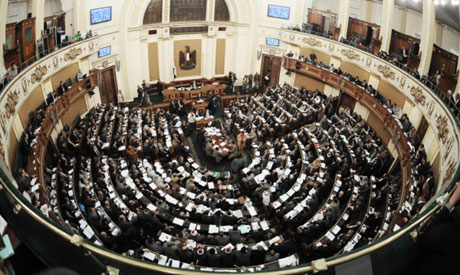
File Photo: A general view of the Egyptian parliament during a working session in Cairo, Egypt (Photo: AP)
Egypt’s parliament provisionally approved on Sunday a 35-article law aimed at regulating the business of medical and clinical research. Parliament speaker Ali Abdel-Aal said the final vote on the law will be postponed to a later date.
"We do not have a two-thirds majority of MPs right now in order to be able to take a final vote on it," Abdel-Aal said.
Abdel-Aal described the law as a progressive step that will give a big boost to the pharmaceutical and drug industry in Egypt, as well as to the scientific and medical research sector.
"Due to intensive medical research, Egypt was able to develop a cure for Hepatitis C," said Abdel-Aal, adding that "as a result, the new law comes to regulate experiments and research necessary to test new drugs and vaccinations before they are licensed and sold on the market."
Abdel-Aal also said that the law goes in line with Article 60 of the constitution, which states that "a human being shall not be subjected to any kind of medical or scientific experiment without his/her certified free will and consent and in accordance with established principles in medical sciences and as regulated by the law."
"The new law comes to turn this article into reality on the ground, with the hope that it will open new horizons in Egypt for medical and scientific research," said Abdel-Aal.
Minister of Health Ahmed Emadeddin explained that "the ministry will be in charge of supervising all kinds of clinical and medical experiments and tests to be regulated by the new law."
"These experiments might be conducted by university professors, physicians, pharmacists, or veterinarians," said Emadeddin, stressing that "only animals will be the subject of pre-clinical tests, which will be conducted in certified labs."
"Egyptians will never be the subject of experiments in pre-clinical research," said Emadeddin.
The new law includes a number of chapters, the first of which deals with the objectives of the law and the instruments of medical research.
Articles 8 and 9 state that a Higher Council on the Ethics of Medical Research will be established to supervise and license all kinds of clinical, medical, and scientific experiments and research and ensure that they observe Egypt's regulations, laws, and codes of local and international ethics.
"Representatives from most concerned state institutions will be members of the board of this council, and all researchers and scientists should seek the prior approval of this council ahead of conducting any medical or clinical experiments and tests," said Emadeddin, adding that "the law states that the council should give or withhold approval within 120 days."
"This is a dramatic shift as the current regulations oblige researchers and scientists to wait for more than one year before they get a response," said Emadeddin.
Articles 15, 16, and 17 state that the rights of human beings who will be subjects of medical and clinical research shall be observed.
"They will not be subjected to any experiments or research unless they give a prior and free approval, while researchers should be highly qualified ones, with proven records in the area of medical research and experiments, and capable of observing international standards in this respect," said the law's explanatory note.
The law also states that experiments and tests shall be conducted only in medical research licensed by the Ministry of Health.
"Private clinics will not be allowed to conduct medical research regulated by the law," said the note, adding that "all precautions should be taken to safeguard human beings against hazardous experiments, and in case of violation of these precautions, medical institutions might face hefty fines ranging between EGP 10,000 and EGP 1 million as well as prison sentences."
Short link: